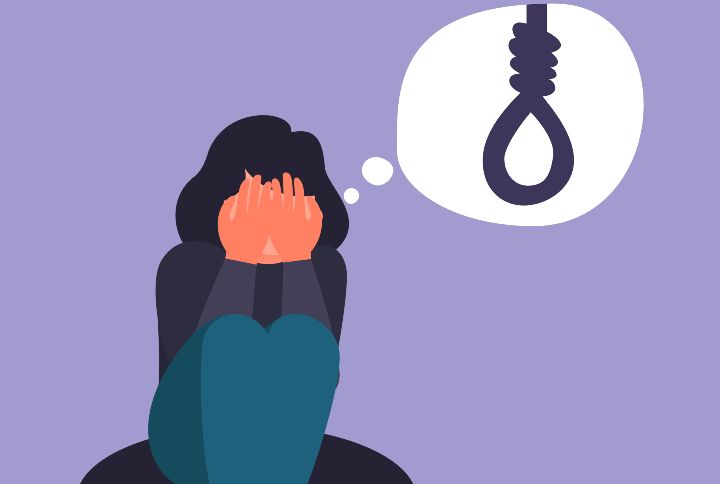2020 has been an extremely difficult year in regards to mental health and emotional well-being. The pandemic claimed several thousand lives, ruined economies, and left family’s broken. Apart from the pandemic, the world also witnessed a lot of suicides that deeply affected them this year. Witnessing a family member become suicidal can be devastating. And since it is World Suicide Prevention Day today, we thought we should try to get a better understanding of it and how to be supportive in the best way possible along with expert guidance and inputs.

We got in touch with Psychologist Anagha Bhave and Nikita Sulay to know about how to help and deal with a family member having suicidal thoughts. Most of us are still working from home and spend most of our time locked inside our houses. And so, it is important for us to be able to help our loved ones when they are going through a suicidal patch properly. Anagha shared the short term and long term preventive measures that one should remember when dealing with a suicidal person. And Nikita gave her inputs on what to say and what not to say to a suicidal person. Scroll down to read all about it.
Short Term Preventive Measures
1. Understand Signs Of Suicide
Remember, signs do not look the same for everyone and it is quite different among teenagers and adults too. And so, it is very important that you understand the signs of suicidal thoughts or tendencies. As per Anagha, some of the most common signs of suicide in teenagers are:
- Changes in mood.
- Talking about self-harm.
- Changes in sleep.
- Changes in appetite.
- Saying things like, “I wonder if anyone will miss me when I am gone“, or “I wonder how many people will attend my funeral“.
- Withdrawal from friends and/or family.
- Unusual neglect of personal hygiene or appearance.
The signs to look out for in adults are a little different than those in teenagers. Some of the most common ones are:
- Changes in sleep patterns.
- Increased alcohol/drug use.
- Self-neglect.
- Stockpiling medications.
- Preparing the will suddenly.
- Goodbyes to loved ones.
Some signs mentioned by Nikita were,
- The person refuses plans or cancels meetups.
- Searches for methods to kill self.
- Sells personal belongings.
- In some individuals, they may plan activities like exorbitant travel or excessive donation to charities.
2. Don’t Dismiss Any Indications Of Suicide
It is a common myth that people who talk about suicide don’t actually do it. But this is not at all true. It is always better to be over precautious than under. Talking about suicide is a major red flag.
3. Seek Professional Help
As a family member or friend, you need to help them seek professional help. Get help with a psychiatrist or a psychologist. And sometimes, it can be scary for the person to go to the sessions all by themselves. So, accompany them to the professional and encourage them to take help.
4. Avoid Arguments & Pieces Of Advice
It is very important on how we react to a family member opening up to us about their suicidal tendencies. Remember to avoid arguing with them, giving too much advice, and especially challenging their notions. Don’t be shocked, devastated, or start blaming yourself when they tell you they’re suicidal. It will just make them more conscious and uncomfortable to share further. Instead, be supportive verbally and/or non-verbally. Give them hope and be non-judgemental.

5. Don’t Hover But Be Attentive
After someone opens up to you about their suicidal thoughts, a natural reaction would be to try to protect them and keep an eye on them at all times. But that doesn’t mean you hover on them all the time. Just keep a watchful eye but don’t make them feel like they’re under surveillance all the time.
6. Create A Safety Plan
Help them in creating a safety plan with the help of a professional. Along with this, you can also create a ‘hope box’ with them—a box containing mementoes of their protective factors (people, achievements, relationships they care about). The hope box and safety plan are to be used when they are feeling actively suicidal.
7. Take Care Of Yourself
Sometimes, all this can take a toll on your mental and physical health too. You might find yourself feeling exhausted, mentally tired and emotionally drained. But you have to remember that you cannot help others if you aren’t okay yourself! You have to take care of yourself and make sure your heart, mind and soul are happy and well.

8. Emergency Numbers List
In case of a situation where you’d need more help, you need to have an emergency numbers list on you all the time.
Long Term Preventive Measures
1. Foster A Comfortable Environment
Contribute to fostering an environment of emotional support and open communication at home. Let everyone feel comfortable in sharing their difficulties and keep it judgement-free.
2. Don’t Avoid Talking About It
It is a common myth that talking about suicide can plant the idea of suicide in the person’s head. And that’s just not how it works. In fact, it may actually reduce the stigma around it and help the suicidal person to come forward and open up.

3. Don’t Bombard Them With News About Suicides
Bombarding a suicidal family member who is emotionally vulnerable with news about suicides may lead to ‘copycat suicides’ i.e. thinking that suicide is a way out. Cases of suicide have been known to go up with incidents like Sushant Singh Rajput‘s death and with series like 13 Reasons Why. So if a person is suicidal and they keep seeing stuff like this they may think it’s a way out.
4. Maintain Good Relations With Their Friends
If you’re a parent, you should maintain good relations with your child’s friends. As they may be able to offer valuable insights into your child’s difficulties if they are not opening up about it themselves.
5. Seek Counselling For Yourself
To be able to help a suicidal family member, you first need to learn a lot yourself. There are a lot of things we might think would prove to be beneficial but actually does the total opposite of it. And so, be a wise and sensible parent/friend/family member and seek counselling yourself to learn how you can be rational and emotionally supportive to them.

Things You Should Say & Things You Should Avoid Saying To A Suicidal Person
What To Say (Or Do)
- Be open-ended. For instance, “I have been noticing some changes in you lately, is there anything that’s bothering you?“
- More than talking, actively listen.
- “It must be hard and really difficult to go through this.“
- “I am there and I will help you through this.”
- “This may seem difficult and overbearing however let’s try if we can get some professional help.”
What Not To Say (Or Do)
- Overreact and magnify the situation.
- “You have everything going right for you, why are you feeling this way?”
- “Stop being so weak, others have it worse than you.“
- “You are just craving for attention, there is nothing wrong with you.“
A Couple Of Things To Remember
- Suicide is not an individual problem, it has intersectional layers to it.
- Understand that you have to support and not treat the person.
You can also follow @missmalinilifestyle for more such information around topics like these.

